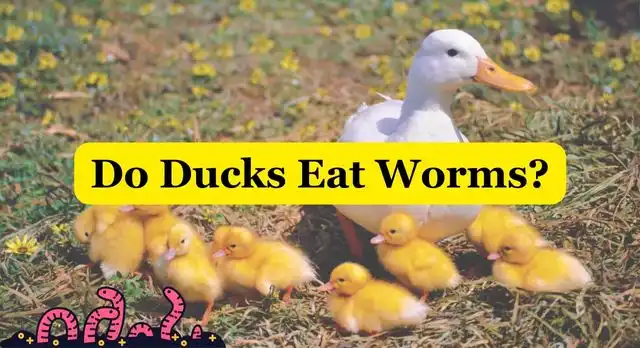Do Ducks Eat Worms? And Do they like earthworms
Ducks are charismatic waterfowl known for their amusing quacks and graceful presence in ponds, lakes, and rivers. As versatile foragers, they have a diverse diet that includes both plant and animal matter. One question that often arises is whether ducks eat worms. In this comprehensive guide, we will explore the dietary preferences of ducks, their feeding habits, and shed light on the truth behind whether ducks have a taste for worms.

Do Ducks Eat Worms? Let’s Find Out!
Yes, ducks like to eat worms. Worms are a natural part of a duck’s diet, particularly for species that forage in wetland habitats. Ducks have a diverse diet that includes aquatic plants, insects, small invertebrates, and even small fish. Worms, with their high protein content, are a nutritious food source for ducks. They can often be found foraging for worms in wet soil, mud, or shallow water. However, it’s important to note that while worms are a part of a duck’s diet, they also consume a variety of other foods depending on their species, habitat, and availability of resources.
Which species of worm do ducks eat for food?
Ducks have a varied diet and will consume a range of worm species and insect larvae for food. Some of the species of worms and insects that ducks eat for food include:
- Earthworms: Ducks often forage for various species of earthworms, such as Lumbricus terrestris (Common Earthworm), Eisenia fetida (Red Wiggler), Aporrectodea caliginosa (Nightcrawler), Dendrobaena veneta (European Nightcrawler), and Lumbricus rubellus (Red Earthworm).
- Mealworms: Ducks readily consume mealworms (Tenebrio molitor), which are high in protein and are often available in both live and dried forms.
- Grub Worms: Grub worms, also known as beetle larvae, are a favorite treat for ducks. These plump, protein-rich larvae are sought after by ducks and are often found in damp soil or decaying wood.
Ducks are opportunistic feeders, and the specific species of worms and insects they eat can vary based on their environment and availability. Offering a variety of these worms and larvae can provide ducks with essential nutrients and protein, contributing to their overall health and well-being.
Do Duck Eat Worm Eggs?
While ducks are known for their omnivorous diets, they primarily target adult worms rather than their eggs. Worm eggs tend to be tucked away in the soil, making them less accessible to our duck companions. When ducks forage in their natural habitats, like wetlands or grassy areas, they are more inclined to feast on fully-grown worms.
Do Ducks Need to Eat Worms?
Ducks, like many other bird species, do not necessarily require worms to survive. However, introducing earthworms into their diet can offer numerous advantages. These wiggly delights are a natural source of essential nutrients that contribute to a duck’s overall well-being. They are rich in protein, vitamins, and minerals, making them a nutritious supplement to a duck’s regular diet.
Can a Baby Duck Eat Worms?
What about our adorable ducklings, the fluffy and delicate newcomers to the avian world? Can they indulge in the earthworm buffet? The answer is yes, baby duck like to eat worms, but with a caveat. Ducklings have more delicate digestive systems, so it’s crucial to provide them with appropriately sized and soft worms. Small earthworms or finely chopped earthworms are suitable choices for young ducklings, ensuring they can digest them without any issues.
Are Earthworms Good For Ducks?
Now that we’ve established that ducks enjoy earthworms, let’s delve into why these wiggly critters are more than just a tasty treat. Earthworms offer a plethora of benefits to our feathered friends.
Prevent Niacin Deficiency
Niacin, also known as vitamin B3, plays a vital role in duck health. A deficiency in niacin can lead to a condition known as “angel wing,” where a duck’s wing feathers twist unnaturally outward. Fortunately, earthworms contain niacin, making them a valuable dietary addition that helps prevent this condition.
Produce Quality Eggs
For those who raise ducks for their eggs, you’ll be delighted to know that earthworms can enhance both egg production and quality. The nutrients in earthworms contribute to stronger eggshells and healthier ducklings if you’re in the business of hatching eggs.
Is It Safe For Ducks To Eat worms?
Absolutely, it is safe for ducks to eat worms. In fact, earthworms are a natural and nutritious part of many ducks’ diets. They provide essential nutrients like protein, vitamins, and minerals, contributing to the overall health and well-being of these waterfowl. Feeding ducks worms can be a safe and enjoyable way to supplement their diet.
How To Feed Earthworms To Ducks?
Feeding earthworms to ducks is a straightforward affair. Simply scatter the worms in areas where your ducks typically forage, such as near ponds or within their enclosures. Ducks possess excellent foraging instincts and will eagerly hunt down these delectable treats.
How Many Earthworms Can A Duck Eat?
The number of earthworms a duck can consume in a day depends on several factors, including the duck’s size, age, and the other components of its diet. On average, a duck can devour anywhere from 100 to 200 earthworms in a single day.
How Often Can A Duck Eat Earthworms?
Now, the crucial question is how often you should offer earthworms to your ducks. The frequency depends on the availability of worms in your area and your ducks’ preferences. A well-balanced diet should include grains, seeds, greens, and earthworms, ensuring your ducks receive all the necessary nutrients.
Conclusion
In conclusion, ducks indeed have an appetite for earthworms, and these wiggly delights can be a valuable addition to their diet. Earthworms offer essential nutrients that promote duck health and well-being, making them a safe and nutritious treat for our feathered friends. Remember to select appropriately sized worms for ducklings and maintain a balanced diet that includes grains, seeds, and greens alongside earthworms. By doing so, you’ll keep your ducks healthy, happy, and quacking contentedly by the pond.
Related Article
